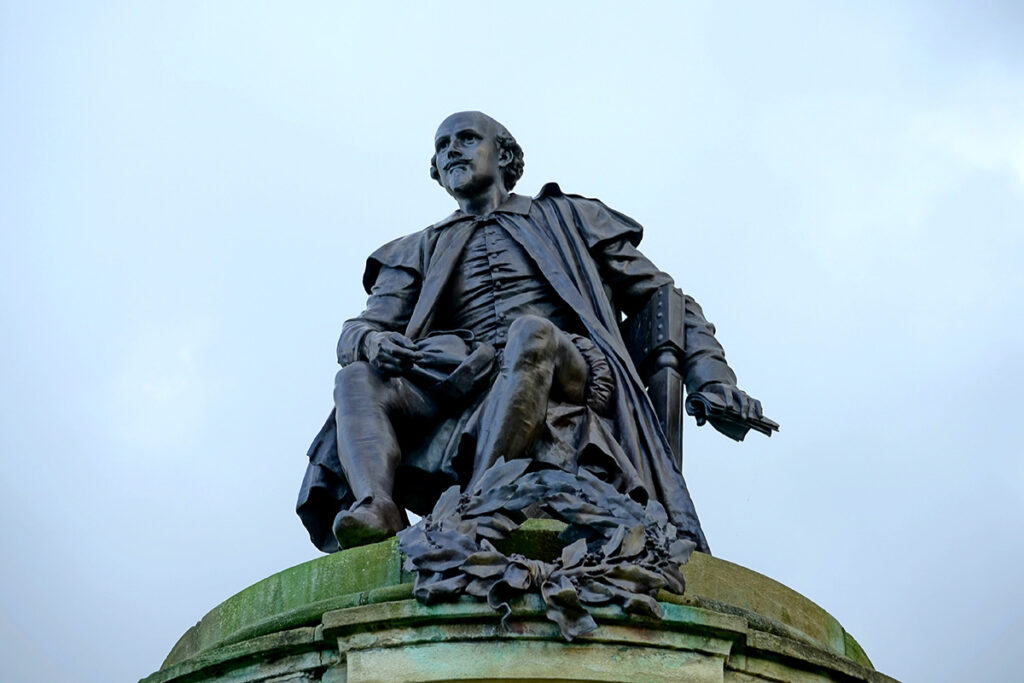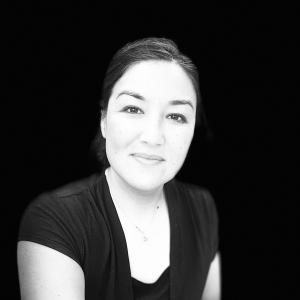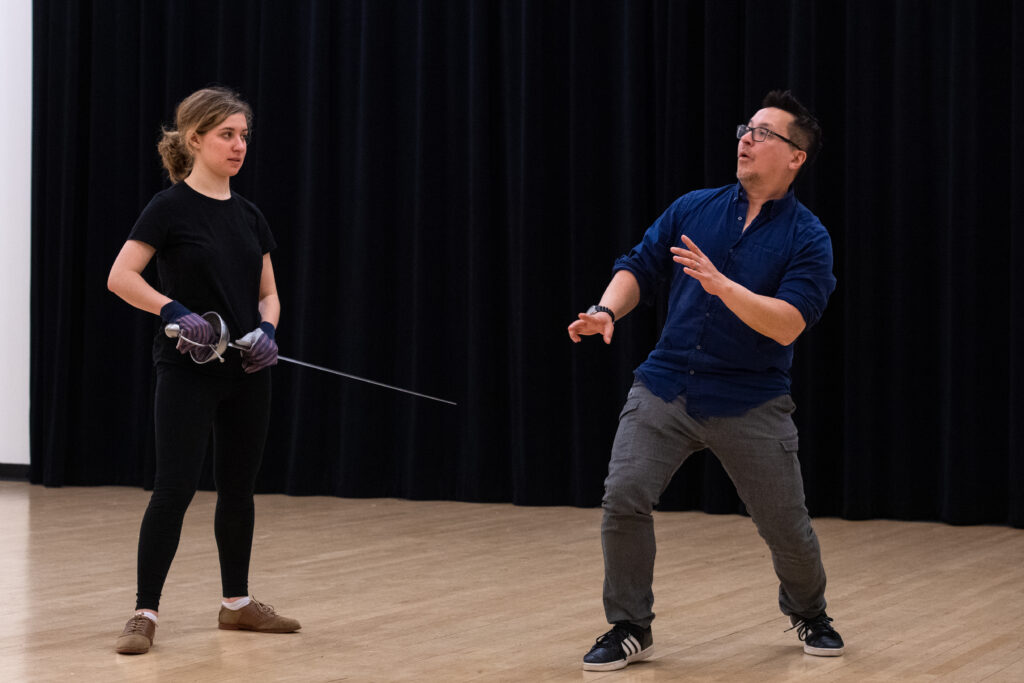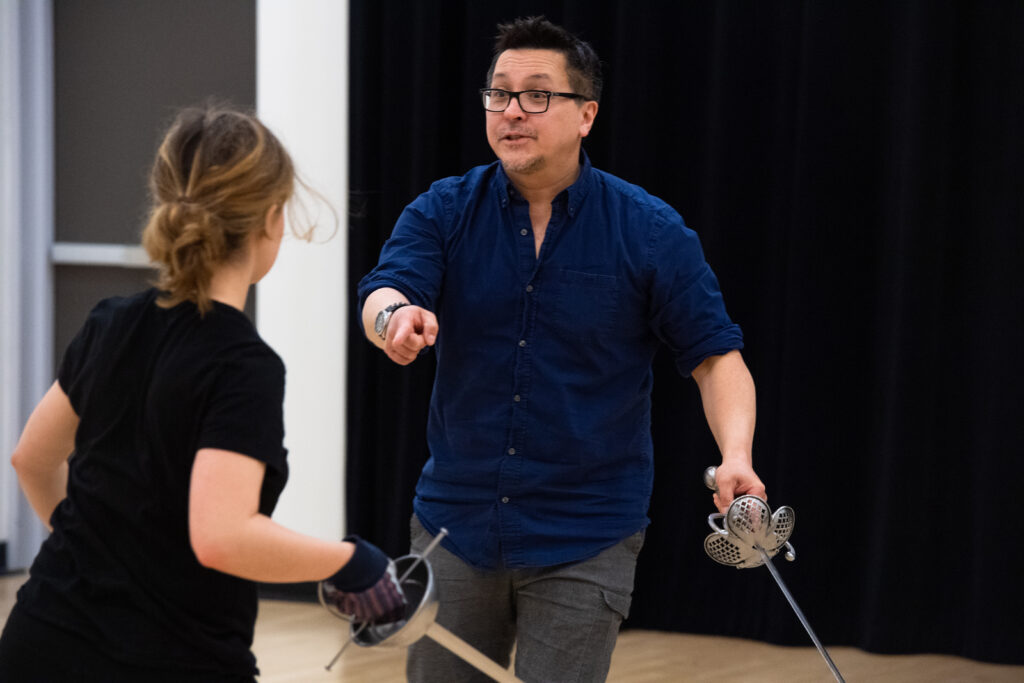Professors on Keeping Shakespeare Fresh, Relevant

William Shakespeare wrote centuries before Black Lives Matter, the current war in Ukraine, and Donald Trump. But those three topics affect which plays of the Bard are performed these days.

Writing, Literature and Publishing Associate Professor Adele Lee, whose research focuses on global Shakespeare, edited Shakespeare and Accentism, and co-edited Shakespare in East Asian Education, said programming trend decisions are made on the basis of which plays are speaking most overtly to the concerns of the times.
“One obvious example is Othello, probably Shakespeare’s most controversial play, and the immense attention it has received due to the Black Lives Matter movement,” said Lee. “Long viewed as imbibed with racism, Othello has been the subject of heated debate, but rather than disappearing from our stages, there appears to have been a recent increase in productions, most of which are trying to use Shakespeare to challenge systemic racism and increase diversity on the stage. A very problematic and risky move, of course.”
Lee noted that since the #MeToo movement, there’s been an increase in productions of Measure for Measure and The Taming of the Shrew. The latter explores gender-based violence, and production companies use it to contribute to current conversations surrounding sexual assault and domestic abuse.
“Plays that chime with the times or speak to hot button issues are more likely to be performed on the festival circuit,” said Lee.
Russia’s attack on Ukraine has led to creatives and academics from Ukraine being invited to lecture and perform at the International Shakespeare Festival in Gdansk, Poland this year, as well as the Equity Shakespeare Festival at the Shakespeare Institute in England, Lee said.
She said it’s important to note that theatre, like society, still has a long way to go in terms of undoing deep-seated and long-standing social and racial inequalities and prejudices. But she points to progress.
“Companies like the [Royal Shakespeare Company] and Shakespeare’s Globe have not just updated their mission statements and made pledges to be more diverse and inclusive, but we are witnessing greater visibility of color, LGBTQ+ people and disabled people in the Shakespeare industry,” said Lee.
Lee points to Michelle Terry’s racially diverse and gender-neutral Hamlet, and As You Like It at the Globe Theatre, and the recent casting of disabled actor Arthur Hughes, as Richard III in an upcoming RSC production.
Lee added there’s been quite a shake-up, with editorial boards adopting more inclusive strategies and increased numbers of symposia and journals directly addressing the issue of race and performance.
Donald Trump has led to a surge in Richard III‘s popularity these days, because the play is about a man willing to go to extreme lengths to ascend to the throne. Lee said other plays about leadership and political process, such as Julius Caesar, enjoyed a resurgence when Trump was in office.

Ted Hewlett, senior artist-in-residence in the Performing Arts Department, teaches stage combat at Emerson, has performed in numerous Shakespeare productions, including Elm Shakespeare Co. and the Actors’ Shakespeare Project, and has choreographed violence for the Shakespeare Theater in Washington, D.C. Hewlett recalls a particular Julius Caesar production that drew criticism.
“It was in modern dress, and there was an uproar because everyone thought that assassinating Caesar was very similar to people talking about assassinating Trump,” said Hewlett.
The Rose of Youth
Keeping Shakespeare productions fresh is not the easiest task considering he wrote his three dozen plays (36 or 39, depending upon who’s counting) in the late-16th, early 17th centuries. In the United States, there is at least one Shakespeare festival in every state.

Regardless of current events, some of the Bard of Avon’s plays are regularly performed because audiences are always up for seeing them.
“There’s a reason we’ve done Romeo and Juliet over and over again for 400 years. We hear it anew,” said Performing Arts Associate Professor Sarah Hickler. “We haven’t seen that person play Romeo, or that person play Juliet. I don’t get tired of it. As a teacher, it’s exciting to impact that language and help students find that size in themselves and grapple with deep issues. Every Shakespeare character is a heartbeat away from falling in love or dying.”
Hickler, who has directed productions for Sedona Shakespeare, LA Women’s Shakespeare, Sun Valley Shakespeare, MIT Shakespeare Ensemble, and Emerson Stage, said the director’s vision and interpretation of the play keeps productions fresh.
“If you’re doing Romeo and Juliet, there’s a million ways to do it and cast with cultural issues today,” Hickler said. “I’ve seen 20 productions of Romeo and Juliet, and each one was very different. You can’t play it without Romeo and Juliet being in love and having those warring households. There are a lot of subtle nuances you can make and it keeps it fresh.”
Interpretations of the plays also change through the years. Hewlett said that productions of Romeo and Juliet didn’t stress the warfare between two families a century ago.
“It was all about the young lovers. In the 20th century, it became more of a play of the violence between the Montagues and the Capulets engulfing Verona,” said Hewlett. “As society shifts, what elements of the play are focused on shift. In World War II, Henry V was used to boast morale for the Allies. It became a very pro-Britain, perhaps jingoist, play of pride against Nazis.”
In terms of popularity of being produced, Hickler said Shakespeare’s historical plays can be more difficult to follow than his comedies and some tragedies.
“The comedies are more accessible, for sure. In the early comedies, the language is more accessible,” said Hickler, who teaches one or two classes about Shakespeare every semester. “Those shows tend to get produced more. Romeo and Juliet, A Midsummer Night’s Dream, Twelfth Night, Much Ado About Nothing. Movies have been made from them, and they’re well known.”
Part of it is financially driven because people want to see plays that they’re familiar with from their school days. Alongside the plays mentioned by Hickler, Lee added The Tempest and Othello into that category.
Summer festivals are popular because they tend to be larger productions that are exciting, with beautiful sets, prat falls, sword fighting, and deep tragedies and comedies draw a large swath of age group.
Lee said along with the company and director, audience demographics impact what is produced.
In India, comedies about mistaken identity, such as The Comedy of Errors, tend to do well, although heavy tragedies like Othello and King Lear are also performed. Korea likes “battles of the sexes” comedies, as well as tragedies centered on family dynamics, such as Titus Andronicus, said Lee. And geography is very important.
“A festival at Kronborg Castle is going to include a production of Hamlet; a festival in Verona, Romeo and Juliet,” said Lee. “Certain plays are simply more popular in specific locations and countries. The Germans love Hamlet. In China, The Merchant of Venice is probably the best-loved play, and interestingly, the struggle between Shylock and the Christians is read there as a struggle between feudalism and capitalism.”
Be Not Afraid of Greatness
Asking a professor to choose their favorite play of the Bard’s is harder than asking them to be or not to be.
Hickler said her favorite depends upon the day. She’s directed Twelfth Night three times, or maybe her favorite is Much Ado About Nothing, or King Lear, or Romeo and Juliet. She also feels The Winter’s Tale is beautiful.
Hewlett loves the humor of A Midsummer Night’s Dream, and he’s seen good productions starring young kids, high schoolers, college students, and professionals. He also loves The Scottish Play (you know what it is) because it’s problematic. And he really enjoyed a recent Emerson production of As You Like It for its ethos.
“I found it so uplifting. It was a celebration of queer identity, queer love, acceptance of transgressions, societal, gender, and parental-child relationships,” said Hewlett. “It was great to see students that I didn’t know at all, or not seen them for a year, or saw a student that I realized I should push them further because I hadn’t yet seen [their acting ability] in class, and that just blew me away.”
But Hickler even admits that she disliked Shakespeare at one point in her life. She had seen several bad productions, the blame for which she lays squarely on the actors. She said a 5-year old could understand Shakespeare, depending upon the actors’ portrayal and delivery.
“Shakespeare in terms of heightened text is spoken word poetry and hip-hop, because there’s a rhythm based on our heartbeats. There’s rhyming and playing with language,” said Hickler.
Does the Leopard Change Its Spots?
Hickler said teaching Shakespeare has changed quite a bit since she began more than 20 years ago.
She said it’s always been important for actors to find a full-bodied expression, and understand heightened text and structure of the verse, because the writing is very particular. The lay of the land, culturally speaking, has changed how to teach, what to teach, and what references to use. But relating Shakespeare to every student is a task unto itself.
“The challenge with Shakespeare is that, for a lot of college students who’ve studied it, it feels exclusive and too intellectual. But this idea is not accurate,” said Hickler. “Shakespeare was an actor, and he wrote for everybody. A lot of teaching Shakespeare is to demystify it to students and help them see how deeply human it is, and how the work speaks so deeply to our common experience.”
It’s hard for Hickler to tell if Shakespeare’s popularity has waned or grown, but she can judge it by the fact that her classes always fill up.
“For many actors, it’s really useful in terms of skill-building, whether you’re in love with Shakespeare or not,” Hickler said.
Hewlett said that as film has changed to have more action and special effects and fighting, (see: The Matrix and Crouching Tiger, Hidden Dragon), the audience expects more spectacles on stage.
“How are we going to do that when we don’t have the same budget or safety mechanisms, and can’t have stunt doubles or CGI effects?” said Hewlett. “Or we won’t use fake blood, we’ll use red ribbons to suggest blood. If we can’t do it in a realistic way, how do we do it in an imaginative, evocative way?”
Sometimes production companies want plays to be bloody like a Quentin Tarantino film.
“Only a big theater can do that because they can afford to splatter blood on set, spend significantly so it doesn’t stain everything, and spend more for the crew to stay after and clean the set,” said Hewlett.

A Mingled Yarn
While many people have found Shakespeare’s plays arduous to understand, it’s up to the actor (or the professor) to help students grasp, and hopefully appreciate, the Bard’s work.
“Just like sushi, Shakespeare was an acquired taste for me,” said Hewlett. “I have a lot of empathy for students [who are] resistant actively or passively.”
Interestingly enough, Lee said there’s one recent current event that has changed the Shakespeare industry – the COVID-19 pandemic.
“Despite financially harming the performing arts, it’s helped rejuvenate it too. As many theatre practitioners and political activists are hoping, the pandemic was a ‘reset button’ offering the opportunity for reflecting and meaningful change,” said Lee.
Categories